The department is organized as an independent subdivision on the basis of soil fertility monitoring department, having gone through a number of reorganizations:
1954 - Department of soil melioration and laboratory of melioration forecasting.
1966 - Laboratory of melioration of irrigated soils,
1991 - Laboratory of melioration and fertility of irrigated soils,
1995 - Department of soil processes modeling.
2008 - Soil melioration sector as part of soil fertility monitoring department.
2013 - Department of melioration of saline soils.
In 1966-1969 the department was headed by a well-known land meliorator in the republic, Candidate of Ag.Sc. Egorichev G.A., from 1969 to 2004 by Academician of the NAS RK Akhanov Zh.U., 2004-2008 by his student Dr. Ag.Sc. Kan V.M., since 2008-2019 was headed by Candidate of biological sciences Otarov A.
Since 2019, the Head of the Saline Soil Amelioration Department has been PhD Poshanov M.N.
The department consists of 5 research staff: 1 PhD, 2 Masters, and 2 doctoral students. The department's young scientists are continuously working to enhance their qualifications.
M. Poshanov is a leading specialist in soil science, agrochemistry, and ecology. His work focuses on the scientific, methodological, and practical guidance of research within the Project. He holds a PhD in Agronomy (specialty 6D080100) and is the Head of the Saline Soil Amelioration Department at "U.U. Uspanov Kazakh Research Institute of Soil Science and Agrochemistry" LLP. He has 11 years of experience in the field, including addressing soil salinity issues and implementing innovative technologies for soil improvement. He is the author and co-author of 38 scientific papers, including 15 in publications recommended by the Committee for Quality Assurance in Education and Science of the Ministry of Science and Higher Education of the Republic of Kazakhstan, 1 production recommendation, and 7 articles with an impact factor (Web of Science & Scopus), with an h-index of 4. JR on the basis of ICARDA (Tashkent) completed an internship on working with the SWAT simulation model, climate change modeling program. In 2017, he completed training on saline soil management at the National Research Center "A.N. Sokolovsky Institute of Soil Science and Agrochemistry". NRC ISA is working with support of FAO. In 2019, he completed internship in digital processing of space images using the ILWIS 3.2 program at the V.V. Dokuchaev Soil Institute, Moscow (Russia).
In 2014, Duysekov S., PhD student in the framework of the international ICARDA project "Knowledge Management" within the framework of the 2nd phase of ICACLRM participated in the seminar "Development of similarity maps to promote selected LRM packages in Central Asia" where he learned how to work in the ArcGIS GIS program. In 2015, he completed internship in digital processing of space images using the ILWIS 3.2 program at the V.V. Dokuchaev Soil Institute (Moscow), and learned the ENVI program at the Institute of Ecology and Geography (Urumqi).
Musayeva K.K. enrolled in PhD studies at KazNAIU in 2024.
Asimzhanov N.S. completed his master's degree in 2018 at KazNAU.
Zarip Zakir completed his master's degree in 2024 at KazNAIU.
Main research areas
- theoretical and applied issues of soil formation process in terms of irrigation and technogenic pollution of soil surface.
- land melioration environmental assessment and zoning of the territory.
- development of scientific foundations for technology of fertility reproduction of irrigated soils and melioration of saline and polluted soils.
- creation of soil-ecological and soil-reclamation information systems (GIS),
- space technology for monitoring and assessing soil melioration state in irrigated areas of the republic:
- development of scientific foundations of space method for monitoring ameliorative state of irrigated soils
- development of space method for large-scale digital mapping of soil salinity degree
- development of methods for studying the long-term dynamics of soil salinity using space method and digital mapping
Services provided by the department
- soil- melioration, soil-ecological and soil-agrochemical survey of fields, recommendations for their effective use.
The department staff carried out research works with the following results:
- soil melioration and hydrogeological surveys and studies of their regime to justify irrigation in the valleys of the Ili and Chu rivers. Based on researches, projects were developed and engineering and melioration systems were built in the Chu River valley and the Ili River delta with irrigation area of 125 thousand hectares;
- soil melioration and hydrogeological surveys and studies of their regime to justify irrigation in the Volga-Ural interfluve. The Ural-Kushum irrigation system was built on the Ural River;
- studies of the efficiency of vertical drainage in the Tas-Otkel irrigation array. 133 vertical wells were built with a total flow rate of 30 l/s; drainage meliorating impact covered an area of 20 thous. ha on the right bank and 10 thous. ha on the left bank of the Chu River. 75,000 thous.ha of irrigated lands have been developed for growing sugar beet and their commercial production has been established;
- development of technological bases for increasing soil fertility and productivity of agricultural crops using mineralized drainage waters of the south of Kazakhstan for irrigation. The Karadala and Aksuet irrigation arrays with an area of 50 thous. ha have been developed;
- development of soil- melioration measures for irrigation and economic development of the lower reaches of the Chu River. Animal-breeding base with pastures on area of 50 thous.ha has been created;
- development of scientific bases of biological farming in the south of Kazakhstan. For the first time in Kazakhstan, experimental work was carried out to develop the technology of biological farming in the South Kazakhstan and Almaty regions at stations;
- development of scientific bases for reproduction of fertility of irrigated lands in the foothills and deserts of Kazakhstan. Principles and technological ways to improve soil fertility have been developed;
- development of scientific bases for reproduction of fertility of gray-brown underdeveloped soils in tobacco growing zone. For the first time, experimental field studies were carried out to develop technology for fertility reproduction of thin gray-brown soils under tobacco;
- study of degradation and phytosanitary state of periodically flooded rice soils in Kazakhstan and development of scientific foundations and practical measures to increase their fertility. The main factors leading to degradation of periodically flooded rice soils in Kazakhstan and the role of phytosanitary state in this process have been determined;
- development of technological bases fertility reproduction of rice soils. Physicochemical priorities and technologies for fertility reproduction of rice soils have been determined;
- development of functional models of fertility reproduction of irrigated soils in the south of Kazakhstan. For the first time, a functional model was developed for fertility reproduction of irrigated soil by dominant traits (nitrogen cycle) based on new materials and resource-saving technologies;
- development of measures to improve and preserve soil fertility in rice fields aimed to improve ecological state. Assessment of current ameliorative state of soils was carried out, soil maps and databases were created, recommendations were made to improve soil fertility and obtain environmentally friendly agricultural products;
- development of operational method for large-scale salt survey of soils based on the study of regularities of links between soil salinization degree and spectral properties of satellite image;
- development of scientific bases for melioration of secondary saline "waste" lands.
- development of scientific foundations for operational method of conducting large-scale salt surveys and mapping salinization degree of irrigated soils (based on example of Akdala irrigation array);
- development of structure and creation of soil-meliorative information system (GIS) of irrigated massif;
- development of scientific, theoretical and practical foundations for the use of a new multifunctional superbiostimulant to increase effective fertility of secondary saline irrigated soils, rice yields and quality of its processed products;
Recommendations developed::
- differentiated technologies for reclamation of saline soils in rice fields without prior leaching and obtaining optimal yield (Almaty, Kyzylorda and South Kazakhstan regions);
- measures to improve arable land from heavy metal pollution;
- methods of development, increasing fertility of soils that have come out of agricultural circulation, unused and low productive.
Projects implemented by the department:
Projects implemented within the system of competitive grants of the World Bank Project and the Ministry of Agriculture of the RK “Improving the competitiveness of agricultural products”.
In 2008-2012, two projects were implemented on the System of Competitive Grants for grant of the World Bank Project and the Ministry of Agriculture of the RK “Improving the competitiveness of agricultural products”.
2008-2012. "Assessment of the current soil-ecological state of rice agrocenoses and development of scientific foundations for the technology of obtaining environmentally friendly crop products". Scientific adviser, Head of Soil Fertility Monitoring Department, Cand.Bio.Sc., A. Otarov. The beneficiaries of the project are "Agrofirma Otes" LLP and "Baimeney" LLP, Balkhash district, Almaty region.
2010-2012. "Development of scientific, theoretical and practical foundations for the use of a new polyfunctional superbiostimulator to increase effective fertility of secondary saline irrigated soils, rice yields and quality of its products." Scientific supervisor, Head of Department of soil fertility monitoring A.Otarov. Beneficiary of the project LLP "Bio-Asia", Balkhash district of Almaty region.
Projects implemented on budget program No. 019 "Services on dissemination and implementation of innovative experience."
In 2013-2016, three projects were completed under the program 019 "Services on dissemination and implementation of innovative experience" in the South Kazakhstan and Kyzylorda regions.
2013. "Agromelioration techniques for increasing salt tolerance of corn on soils of the South Kazakhstan region." Scientific supervisor – LR of Saline Soils Reclamation Department, Cand.Bio.Sc. A. Mamonov.
2014. “Assessment of the current soil and melioration state of the territory of the 1st crop rotation of the LLP “I. Zhakhayev Kazakh Research Institute of Rice Production". Scientific supervisor, Head of the Department of reclamation of saline soils, Cand.Bio.Sc. A. Otarov.
2016. "Introduction into production of innovative technology for increasing fertility of saline soils and training farmers in basics of technology." Scientific supervisor- Head of Saline Soil Reclamation Department, Cand.Bio.Sc. A. Otarov.
Contract works (projects executed under a contract with farms and other customers)
2010-2011. "Testing the effect of complex organomineral fertilizer "Green Eco" on yield capacity of rice crops in conditions of the Akdala irrigation array." Scientific adviser Cand.Bio.Sc. A. Otarov.
2011. "The current state of soil surface of Shieli state variety testing site of Kyzylorda region and necessary measures aimed to improve them." Scientific supervisor Cand.Bio.Sc. A. Otarov.
The work on the study of the degree of provision of soils of Shieli State variety-testing plot of Kyzylorda region with basic nutrients has been carried out, recommendation on rational use of mineral fertilizers has been developed.
2012. "The current state of soil surface of Tumar LLP and necessary measures to improve them." Scientific adviser Cand.Bio.Sc. A. Otarov.
2013. "Testing the effect of the drug "Edagum SM" on yield capacity of agricultural crops" in conditions of Akdala irrigation array. Scientific supervisor Cand.Bio.Sc. A. Otarov.
2014 "Conducting experimental tests of sublimated peat-based granular mixture (NISABA) in rice growing." Scientific adviser Cand.Bio.Sc. A. Otarov.
2016-17. “Assessment of the current state of soil surface of RZA-Agro LLP”. Scientific adviser Cand.Bio.Sc. Otarov.
International projects
2003-2006. International project: “Co-ordination of scientific activities towards elaboration of common strategy for environmental protection and sustainable management in Syr Darya River Basin, in Uzbekistan and Kazakhstan”. Scientific supervisor of Kazakhstani part of the project, Cand.Bio.Sc. A. Otarov.
2007-2008. International Framework Project: "Research on sustainable land management" on grant from the International Center for Agricultural Research (ICARDA, Syria), Scientific supervisor of Kazakhstani part of the project, Cand.bio.Sc. A. Otarov
2010-11. International project "Assessment of vulnerability of agro-ecosystems in Central Asia in relation to negative impacts of climate change - growing and yield capacity of spring and winter wheat." Grant from the International Center for Agricultural Research (ICARDA, Syria). Scientific supervisor of Kazakhstani part of the project, Cand.Bio.Sc. A. Otarov
2013-2015. International project “Development of methods for assessing soil quality, crop yield potential and water conservation for sustainable agricultural development” within grant from Federal Agency for Agriculture (BLE) and Federal Ministry of Agriculture (BMELV) of Germany. Together with Leibniz Center for Study of Agricultural Landscapes (Müncheberg, Germany).
The project was aimed at strengthening and expanding scientific ties between scientists from Kazakhstan and the EU. Based on the project results, scientific article (http://link.springer.com/chapter/10.1007/978-3-319-01017-5_41) was published in the collective monograph Novel Measurement and Assessment Tools for Monitoring and Management of Land and Water Resources in Agricultural Landscapes of Central Asia.
2014-2016. International project: "Knowledge Management" in the framework of the 2nd phase of CACILM on grant from the International Center for Agricultural Research (ICARDA, Syria), scientific supervisor of the 3-component of Kazakhstani part of the project Cand.Bio.Sc. A. Otarov.
The project is aimed at dissemination of agricultural knowledge accumulated during the 1st phase of CACILM among farmers in Central Asian countries and Kazakhstan. As a result of the project, ten technologies of Kazakhstani scientists were selected for inclusion in the Project database. For rainfed ecosystems - 2, for irrigated ecosystems - 5 and for pasture ecosystems - 2.
2015. International Small Project: Climate Change Adaptation: Ensuring Food Security in Central Asia. Remote tools for assessing and combating soil salinization in the Aral Sea basin. Grant No. 609528 - STI. International Cooperation Network for Eastern Partnership countries (IncoNet CA Twinning Grants) within the framework of the EU "Horizon 2020" Project.
Based on the Project results, video clip was released https://www.youtube.com/watch?v=2e6avQVTrVw&feature=youtu.be
2014-2016. International project "Development of method for biological melioration of saline soils using licorice (Glycyrrhiza glabra L.)". Together with the Institute of Ecology and Geography of the AS of China. Scientific adviser Cand.Bio.Sc. A. Otarov.
Work has been carried out on development of methods for biological amelioration of secondary saline soils that are out of agricultural use. The object of study is saline soils of the Akdala massif.
2014-2017. International project "Development of drip irrigation method for rice and its impact on soil properties." Jointly with the Institute of Ecology and Geography of the AS of China. Scientific adviser Cand.Bio.Sc. A. Otarov.
The main goal of the study was to develop method of rice drip irrigation and study its effect on basic soil properties. The research object is saline soils of the Akdala massif.
2016-2018. International project "Development of method for obtaining slow-acting fertilizer from aluminosilicates". The leading institute is the Institute of General and Inorganic Chemistry of the NAS of the RA (Armenia).
2013-2015: MES RK State Funding (GF) Project: "Study of the Dynamics of Soil Salinization in Irrigated Areas of Southern Kazakhstan" (№0115РК01013).
Object of research: The soils of the Shaulder irrigation massif.
Aim of the work: To create an information system for the Shaulder irrigation massif and, based on it, to develop a remote sensing method for studying soil salinization dynamics.
The work was performed using both traditional ground-based and remote sensing (space-based) soil investigation methods.
Based on the study of the correlation between the spectral properties of QuickBird, Pleiades 1A/1B, LANDSAT TM5 satellite images and the electrical conductivity of irrigated soils, it was established that this correlation largely depends on the timing of the satellite imagery.
When satellite imagery was conducted in the autumn period in the study area, a statistically significant correlation was only found for the 50-100 cm soil layer under alfalfa crops (QuickBird) and the 20-50 cm (Pleiades 1A/1B) and 50-100 cm (LANDSAT TM5) layers under corn crops. For the remaining depths, it was not possible to build a reliable regression model for the automated decoding of soil salinization. This situation can be corrected by a more careful selection of the satellite imaging time, which may be the subject of further research.
The long-term archive of Landsat TM5 satellite images can be used to analyze the dynamics of soil salinization in the region, but only at a qualitative or semi-quantitative level. This is because quantitative regressions require images obtained in the same year as the field soil surveys, and the latest images received by this sensor date back to the end of 2011. Furthermore, the degree of generalization of the satellite images and the strong spatial variability of soil salinization have a significant influence. To detect changes in soil salinization dynamics, it is necessary to analyze images obtained during the same imaging season and over a series of consecutive years, which helps exclude the influence of the cultivated crop type on soil salinization detection.
The analysis conducted showed that the soil salinization in the Shaulder irrigated massif increased significantly during the period from 1987 to 2010: the proportion of highly saline soils grew more than 4 times.
Application area: Agriculture.
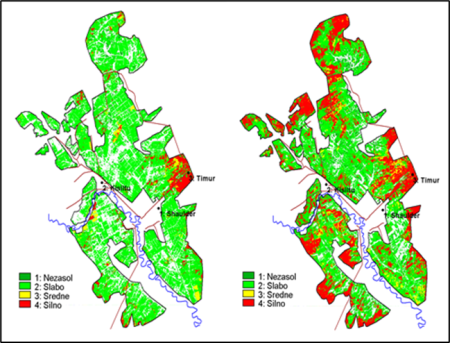
Figure 1 – Soil Salinity for 1987-1988 (left) and 2010-2009 (right) (1—non-saline, 2—slightly saline, 3—medium saline, 4—highly saline).
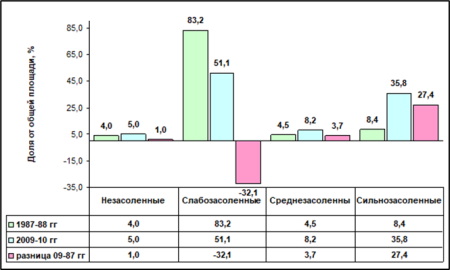
Figure 2 – Dynamics of Soil Salinization in the Period from 1987 to 2010
2015-2017. MFA RK SP "Monitoring of heavy metals and organic pollutants in irrigated soils using GIS and development of methods to increase soil protective properties against pollutants" (No. 0115RK02027).
Object of research: The soils of the Shaulder irrigation massif.
Main goal of the work: To create an information system (GIS) for the Shaulder irrigation massif, to assess the content of heavy metals in the soils, and to identify the priority heavy metals of the massif.
The work was performed using traditional ground-based soil investigation methods, GIS methods, and digital soil mapping.
Obtained Results:
Cadmium (Cd) in the studied soils shows a sufficiently high excess of the Earth's crust clarke (average content): the concentration factor (KC) is equal to 19.5±0.28.
Lead (Pb) and Copper (Cu) accumulate most in the arable A horizon, where their accumulation coefficients (KH) are 1.3±0.23 and 1.3±0.02, respectively. Cd and Pb are distinguished by the magnitude of their migration intensity, with their mobility factors (RX) being 54.2±2.82 and 33.3±1.36, respectively. In terms of the Hazard Index (KO), Nickel (Ni) is the most ecologically dangerous heavy metal, with a hazard coefficient equal to 1.8±0.020. Therefore, we propose including this metal in the list of priority elements subject to constant monitoring.
The overall irrigation process in these massif soils leads to an increase in the proportion of mobile forms of Cd, Pb, and especially Ni, while the proportion of mobile forms of Cu and Zn decreases. In terms of Zn content, soils of Group 5 predominate on the massif territory, occupying 67.8% of the surveyed area. For Cu, soils of Groups 3 and 2 predominate, occupying 25.9% and 37.5%, respectively. Conversely, for Pb, soils with low content of this element (Group 2) predominate, occupying 52.7%. For Cd content, Group 5 soils prevail, and for Ni, Group 4 soils prevail, occupying 70.2% and 42.2% of the surveyed area, respectively.
Cu, Ni, and Cd differ in the number of contours they occupy (heterogeneity), having 166, 133, and 128 contours, respectively. Two DDT metabolites, 4,4’-dichlorodiphenylethane (DDE) and 4,4’-dichlorodiphenyltrichloroethane (DDT), show relatively high content (but not exceeding the Maximum Permissible Concentration - MPC) in the massif soils, with values of 40.4±9.0 and 21.0±3.43μg per 1 kg of soil, respectively. Bentonite clay, depending on the dose applied, reduces the uptake of Nickel into the most valuable part of the corn plant—the grain—by 15.8−26.3%. A similar pattern is characteristic of other corn organs (stems and leaves).
Application Area: Ecology and Agriculture.
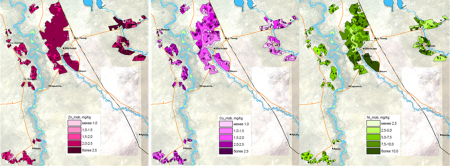
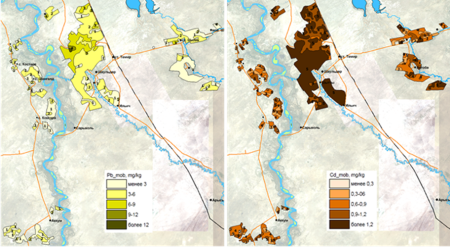
Figure 3 – Map of the Content of Mobile Forms of Heavy Metals (Zn, Cu, Pb, Cd, Ni) in the Soils of the Shaulder Irrigation Massif.
2015-2017. MFA RK SP "Development of local monitoring technology for salinity of irrigated soils and its approbation using the example of the Arys-Turkestan irrigation array, South Kazakhstan Region" (No. 0115RK02034).
Research Context and Methodology:
Object of research: The soils of the Arys-Turkestan irrigation massif.
Aim of the work: To establish the relationship between the spectral properties of satellite images and soil salinity, and based on this, to create a soil salinity map and develop a method for local soil salinity monitoring.
Obtained Results: The spectral characteristics of Landsat 8 OLI satellite images and the photosynthetic activity (biomass) of crops can be used for the deciphering/identification of corn and cotton crops. An important factor is that the crops must have the maximum possible green mass at the time of imaging. The correlation between the brightness characteristics of Landsat 8 OLI satellite image pixels and the ion-salt composition of the soils (water extract) can be used to create soil salinity maps. Using the tonal values of the image channels, their ratios, and a number of vegetation indices, layered maps of the degree of soil salinity for the object of study were compiled. In the Tortkul massif territory, the area of saline soils increases with depth from 14.3% (0-20 cm) to 23.8% (50-100 cm), which indicates that the soils in this profile are at the initial stage of desalinization. Conversely, in the Stary Ikan profile territory, the maximum proportion (36.5%) of the area with saline soils occurs in the 0-20 cm horizon, and the minimum proportion (29.6%) occurs in the 50-100 cm horizon, which indicates that the process of secondary soil salinization is developed in this profile.
The convergence of the soil contours on the compiled map with the results of ground-based surveys was 76.6% for the 0-20 cm layer, 78.1% for the 20-50 cm layer, and 67.2% for the 50-100 cm layer. It was established that the convergence of the compiled map with the results of the ground survey decreases with increasing depth. We propose using this methodology for local monitoring of soil salinity in irrigated areas.
Application area: Agriculture.
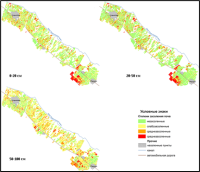 | 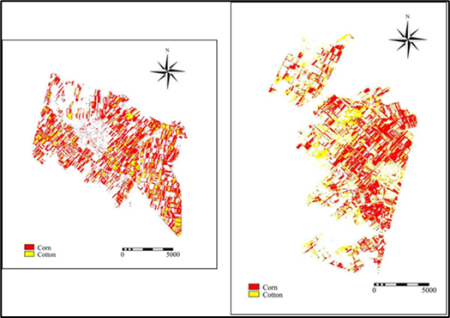 |
Figure 4 – Map of the Degree of Soil Salinity in the Arys-Turkestan Irrigation Massif (based on Tortkul and Stary Ikan profiles)
| Figure 5 – Result of Automatic Classification of Fields by Crops (Stary Ikan on the left, Tortkul on the right)
|
2015-2017: MES RK State Funding (GF) Project: "Research on the Long-term Dynamics of Soil Salinization in the Modern Ili River Delta using Remote Sensing Methods" (№3651/ГФ4).
Object of research: The soils of the lower reaches of the Ili River.
Aim of the research work (NI R): To study the long-term dynamics of soil salinization in the modern Ili River Delta.
Research methods: Traditional ground-based and remote sensing (space-based) soil investigation methods.
Obtained Results: Based on the research, it was established that the image tone in individual channels of the satellite images proved to be insufficiently informative for assessing soil salinization; the most informative factors were the ratios of tones in individual imaging channels and vegetation indices. Quantiles calculated in the ILWIS software based on image tone values were used as class boundaries. As a result, contours of saline soils with different degrees of salinization were defined, and subsequently, all geographical objects were compiled into a map.
Analysis of the cartographic material showed that the process of drying out and soil salinization is most pronounced in the Toparskaya and Dzhide-linskaya channel systems and at the head of the delta. Hydromorphic landscapes with non-saline soils were concentrated along the Dzhide-ly, Ku-galy, Ir, and Arystandy channels. Comparison of the areas of different degrees of soil salinization showed that the area of non-saline soils decreased by 386.2 thousand hectares (41.3%) over 37 years. During the same period, the areas of slightly and medium saline soils increased by 2.4% and 15.7%, respectively. The area of highly saline soils increased by 21.4%, or 199.9 thousand hectares.
Thus, the modern delta territory currently faces a severe meliorative situation due to the cessation of spring and summer floods. To maintain and preserve the delta, it is necessary to establish artificial water distribution across the delta territory using hydraulic engineering structures on the main channels. It is also necessary to resume the project for the construction of the Kerbulak counter-regulator below the Kapchagay reservoir, which will significantly improve the watering of the Ili River delta during the growing season through seasonal regulation of its flow.
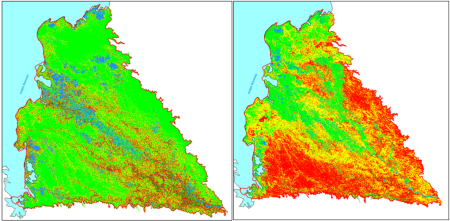
Figure 6 – Maps of Soil Salinity in the Modern Ili River Delta (1979 – left, 2016 – right)
2018-2020. 267 BP MFA RK TCP "Problems of irrigated saline soils in Turkestan region and their solution based on the application of innovative technology for increasing soil fertility and crop yield" Activity: "Apply technology for increasing fertility of saline soils and yield of agricultural crops (corn for grain) and train farmers in the basics of the technology" (No. 0118RK01386).
2021-2023. 267 BP MFA RK TCP "Scientific and technological support for the preservation and reproduction of fertility of agricultural lands" (No. 0121RK00718).
2022-2024. Under a grant from the MSHE RK "Management of the production process of agricultural crops and assessment of nitrogen emission by soils of agrophytocenoses in the conditions of southeast Kazakhstan" (No. 0122RK00310).
2024-2026. 267 BP MFA RK TCP "Ensuring rational use of agricultural lands in intensive farming based on new approaches in preserving and reproducing soil fertility" Activity: "Study the soil cover and its features of the developed lands adjacent to the Koksarai reservoir using GIS technologies and remote sensing methods, and provide recommendations for their use in irrigated agriculture" (BR22885097).
Recommendations on improvement of soil fertility and crop yields were published.
According to the results of long-term researches, more than 200 scientific papers have been published by the department staff.
Work completed in 2025 within the framework of the MA RK's Scientific and Technical Project (STP) for 2024-2026.
Scientific and Technical Project (STP) of the Ministry of Agriculture of the Republic of Kazakhstan for 2024-2026
As part of the Ministry of Agriculture of the Republic of Kazakhstan's project for 2024-2026, "Ensuring rational use of agricultural lands in intensive farming based on new approaches to preserving and restoring soil fertility," and specifically for Task No. 2, I conducted field scientific research. This research focused on studying the soil cover and its characteristics of the developing lands adjacent to the Koksarai reservoir, utilizing GIS technologies and remote sensing (RS) methods, and developing recommendations for their use in irrigated agriculture. The project's objective is to ensure the rational use of agricultural lands within intensive farming systems, contributing to the reproduction of soil fertility and the sustainable increase in agricultural crop productivity.
This study aims to investigate the soil cover and its characteristics of the developing lands located near the Koksarai reservoir, using GIS technologies and remote sensing methods. This will facilitate the development of recommendations for their rational use in irrigated agriculture, as well as ensure the effective application of agricultural lands in intensive farming systems that promote soil fertility restoration and sustainable crop yield increases.
The research object is the southern part of the Shaulder irrigated massif in Otyrar district, Turkestan region, as well as an area of 7500 ha located 9 km northwest of the Koksarai reservoir. This territory extends to the Syr Darya river and is bordered by an old river terrace and the Arys-Turkestan irrigated massif.
To conduct reconnaissance surveys on the 7500 ha territory of the research object, a base map was prepared, and specific plots were selected. Throughout the project implementation, the GIS system is continuously updated, providing comprehensive data on the condition of the investigated area.
Salt and agrochemical surveys were conducted at the research object by collecting soil samples. 453 samples were taken from various depths (0-20 cm, 20-50 cm, and 50-100 cm) and sent to the Institute's laboratory. Agrochemical analyses determine the content of nitrogen, phosphorus, and potassium, while salinity analysis assesses the degree of soil salinization (total salt content, sodium, magnesium, calcium, chlorides, and sulfates). Physico-chemical properties (mechanical composition, pH acidity) are also determined. This data provides a complete picture of the soil condition.
Furthermore, observation wells were installed in the study area, allowing for continuous monitoring of groundwater levels and mineralization. These studies will be crucial for optimizing agricultural production in the region.
Based on the results of long-term research, department staff have published 223 scientific works.
1. A. Otarov, A. Vyrahmanova M. Polatova. Tools of reduction of heavy metals uptake by plants// Abstract book “10th The Proceedings of the International Soil Science Congress on “Environment and Soil Resources Conservation”. 17-19 Oktober 2018. – Almaty, Kazakhstan, 2018 - P.103.
2. A. Otarov, M. Polatova, A. Vyrahmanova. Background concentration of heavy metals in soils of modern delta of Ili river. International Soil Science Congress on “Soil Sciense in International Year of Soils 2015”, Sochi-Russia. 2015. P. 158.
3. Poshanov M.N., Otarov A., Ibrayeva M.A., Duysekov S., Suleymenova A. Opyt primeneniya kosmicheskogo metoda dlya obnaruzheniya vyshedshikh iz selskokhozyaystvennogo oborota «zalezhnykh» zasolennykh zemel zony orosheniya i otsenka ikh sovremennogo sostoyaniya. Pochvovedeniye i agrokhimiya. 2020;(1):29-41. https://journal.soil.kz/jour/article/view/635
4. Vyrakhmanova A.S., Otarov A., Poshanov M.N., Dүysekov S.N., Suleymenova A.I. Shәuіldіr suarmaly alқabynyң ezhelgі allyuvialdy terrassalyқ (zhoғarғy) bөlіgі topyraқtaryndaғy auyr metaldardyң negіzgі geokhimiyalyқ kөrsetkіshterі. Іzdenіster, nәtizheler. Issledovaniya, rezultaty// №1 (85) 2020. S. 284-293.
5. Poshanov M. N., Kenenbayev S.B., Ibrayeva M.A., Vyrakhmanova A., Duysekov S., Suleymenova A.. Vliyaniye stepeni zasoleniya pochv i primeneniya biopreparata na produktivnost kukuruzy. Pochvovedeniye i agrokhimiya. Zhurnal. 2021zh №1. https://doi.org/10.51886/1999-740X_2021_1_44
6. Poshanov M.N., Kenenbayev S.B., Ibrayeva M.A., Vyrakhmanova A.S., Duysekov S.N., Suleymenova A.I. Vliyaniye stepeni zasoleniya pochv i primeneniya biopreparata na produktivnost kukuruzy. Pochvovedeniye i agrokhimiya. 2021;(1):44-56. https://doi.org/10.51886/1999-740X_2021_1_44.
7. Poshanov, M. N., Laiskhanov, S. U., Smanov, Z. M., Kenenbayev, S. B., Aliaskarov, D. T., Abikbayev, Y. R., Vyrakhmanova, A. S. & Askanbek, A. (2022). The Effects of the Degree of Soil Salinity and the Bio preparation on Productivity of Maize in the Shaulder Irrigated Massif. OnLine Journal of Biological Sciences, 22(1), 58-67. https://doi.org/10.3844/ojbsci.2022.58.67.
8. Suska-Malawska M., Vyrakhamanova A., Ibraeva M., Poshanov M., Sulwiński M., Toderich K., Mętrak M. Spatial and In-Depth Distribution of Soil Salinity and Heavy Metals (Pb, Zn, Cd, Ni, Cu) in Arable Irrigated Soils in Southern Kazakhstan. Agronomy. 2022; 12(5):1207. https://doi.org/10.3390/agronomy12051207.
9. Laiskhanov, S. U., Poshanov, M. N., Smanov, Z. M., Kaimuldinova, K. D., Myrzaly, N. B., Ussenov, N. E., Azimkhanov, B. (2022). A Study of the Effects of Soil Salinity on the Growth and Development of Maize (Zea Mays L.) by using Sentinel-2 Imagery. OnLine Journal of Biological Sciences, 22(3), 323-332. https://doi.org/10.3844/ojbsci.2022.323.332.
10. Suleymenova A.I., Ibrayeva M.A., Vyrakhmanova A.S., Poshanov M.N., Dүysekov S.N., Smanov Zh.M. Sravnitelnoye izucheniye vliyaniya kapelnogo orosheniya i orosheniya sposobom postoyannogo zatopleniya risa na razlichnye formy azota risovo-bolotnykh pochv. Pochvovedeniye i agrokhimiya. 2022;(1):29-39. https://doi.org/10.51886/1999-740X_2022_1_29
11. Ramazanova, R., Tanirbergenov, S., Sharypova, T., Zhumagulova, M., Suleimenova, A., & Poshanov, M. (2024). The Influence of Organic-Mineral Foliar Fertilizers on Soil Mineral Nitrogen, Nitrous Oxide Emissions and Crop Productivity. Preprints. https://doi.org/10.20944/preprints202406.1033.v1
12. Poshanov M.N., Ramazanova R.Kh., Dүysekov S.N., Әsіmzhanov N.S., Zәrіp Z.A. Kөksaray su қoymasyna іrgeles zhatқan zherlerdің agrokhimiyalyқ zhәne topyraқ-melioratsiyalyқ zhaғdayyn gazh arқyly zhәne dalalyқ zertteuler negіzіnde baғalau. Topyraқtanu zhәne agrokhimiya. 2025;(3):45-58. https://doi.org/10.51886/1999-740X_2025_3_45




